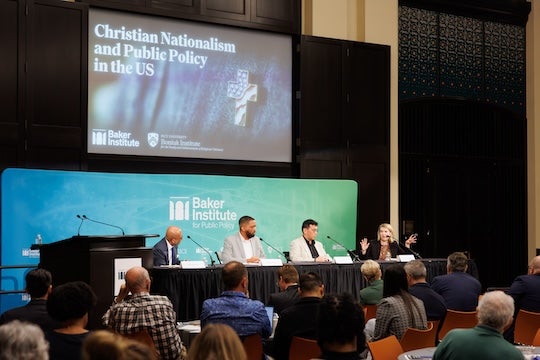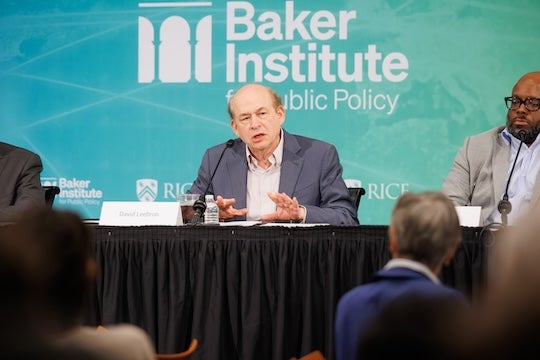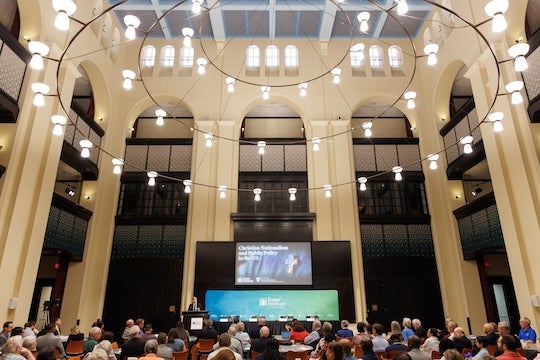Rice University’s Baker Institute for Public Policy’s Religion and Public Policy program and the Boniuk Institute for the Study and Advancement of Religious Tolerance hosted a daylong event April 26 to examine how Christian nationalism — an ideology and movement advocating a fusion of Christian symbols with American civic life — has risen to prominence over the past several years and its real-world implications for politics and policy.
The conference brought together leading experts to discuss and reflect upon this ideology within American religious and political life with panelists exploring questions such as: What are its origins? Is it most closely related to race, politics or religion?

Rachel Schneider, director of the Religion and Public Policy program and academic programming at the Boniuk Institute and assistant research professor in Rice’s Department of Religion, described how people who ascribe to the idea of divine blessings or favor to the social order can feel empowered to go against the ideas of other Americans.
“As someone who has been really involved in anti-racist organizing, has worked with faith communities and is someone who understands the logics of Christian nationalism because I grew up in white evangelicalism, I bring all those lenses to bear on what we’re talking about today,” Schneider said.
“Christian nationalism is primarily a movement about gaining, retaining and asserting power. It is about not just a vision but also a fundamental belief in who deserves to be at the top, who should have power, who is entitled to this nation, who is entitled to full citizenship, who is entitled to full belonging and then the willingness to use cultural, economic, political, legal means to ensure and enact that sense of power. But also increasingly we see extralegal means - the willingness to use violence to go beyond just changing hearts and minds.”
“The power is not an end pursuit for them, it is a mechanism by which they can ‘love’ us who are not purified yet,” said fellow panelist Glenn Bracey, assistant professor of sociology and criminology at Villanova University and co-author of “The Religion of Whiteness: How Racism Distorts Christian Faith.”

Former Rice President David Leebron joined a panel about the line between political and religious institutions and explained the “exceedingly complex issues.” He referenced the writings of John Locke, among the originators of the idea of church and state separation, and said universities need to educate students on the history of that idea in regards to the United States.
“What disturbs me is this complete mischaracterization of the history of the United States and how it came to be,” Leebron said. “We had a pretty clear idea at the founding of our republic of the idea of separation of church and state.”
The conference was the inaugural event in the Visiting Distinguished Scholars Series, funded by the Bryan J. & June B. Zwan Endowment and co-sponsored by the Baker Institute’s Religion and Public Policy program and the Boniuk Institute, a premier interdisciplinary research and scholarly institute that aims to understand the conditions which lead to religious pluralism, tolerance, intolerance, conflict and discrimination then help people apply its findings in their lives and communities.
All who preregistered and attended in person also received a free, signed copy of the brand new book “The Religion of Whiteness” (Oxford University Press, 2024), co-authored by Bracey and Michael Emerson, the Baker Institute’s Harry and Hazel Chavanne Fellow in Religion and Public Policy.
View the full conference here.

